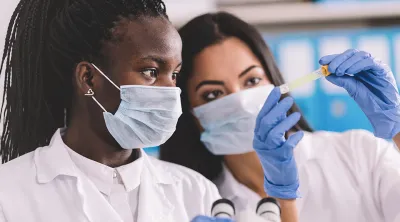To advance personalized medicine, All of Us recruits diverse participants

Nearly 360,000 people have signed on so far to participate in a landmark effort to advance the science of precision medicine. But there’s room for more. Many more.
The goal of the All of Us Research Program, one of the nation’s most ambitious research projects ever, is to help scientists learn more about precision medicine, also known as personalized healthcare. The research program is historic in size and scope. It’s also different in terms of a commitment to involve participants in the process, share progress and provide access to the data participants share. For some, that’s a welcome departure from some kinds of medical research, one that swaps the idea of a “subject” for a “participant.” Blue Cross and Blue Shield companies, such as Blue Cross and Blue Shield of Louisiana, are reaching out to the local communities they serve to encourage participation in All of Us.
Aiming for a million participants to change the future of medicine
All of Us, a project of the National Institutes of Health, aims to enroll a million adults living in the United States to build one of the richest sets of health data ever created. The goal is to collect a breadth and depth of data from a diverse group of people. Scientists from a range of disciplines will be able to apply for secure access to the data (with participants’ privacy protected) to explore ways to tailor the prevention and treatment of health conditions.
Scientists might find answers that help people right away. Some discoveries may not be ready to help people for years to come. In one way, participating is like contributing to the next generation’s bank account. In another, it could enrich you with information about your own health, such as an analysis of your DNA, that could be useful in conversations with your doctor. That’s one example of the kind of information All of Us may share back with people who participate.
Research that represents your community
Ed Ramos, director of digital clinical trials at Scripps Research, which partners with All of Us, says recruiting a diversity of participants is key for this project. And there are reasons why that’s not always so easy. To encourage participation among people of color, for example, “We have to establish trust with communities,” says Ramos. He’s referring not only to a history of mistreatment of people of color in research trials, but a lack of effort to recruit a diversity of participants. With All of Us, says Ramos, “We have an opportunity to learn more about specific communities.” For example, scientists may be able to learn more about how people of color are affected differently by diabetes. That could help them develop more effective, more personalized treatments. Ramos says that, as a scientist, that’s one of the most exciting prospects.
Making medicine more precise
Right now, scientists don’t always have the tools they need to offer more targeted, individualized treatment. That kind of treatment takes into account your genetics, your lifestyle, your environment and your family history. Scientists need that data—and lots of it—to make strides in precision medicine. Data from a million participants, versus just a few thousand, for example, could help them see patterns they might not see in a smaller data set. In other words, the bigger the data pool, the likelier it is that scientists might be able to develop a treatment or a prevention strategy that fits you.
What it’s like to participate
Participants answer surveys about their health, environment and family history. They might give blood or saliva samples for DNA analysis, or enable access to their electronic health records to give researchers an even richer picture. That might sound like a lot of information to disclose about your health, but the more data scientists have, the more equipped they’ll be to find personalized treatments for a range of health conditions. The data is stored on protected computers and All of Us limits and tracks who can see the information. Participants will also receive regular updates on the project’s process, as well as information about their own health.
Gathering data beyond the clinic
At Scripps, Ramos is responsible for developing new ways to broaden participation. “We’ve established a new center focused on conducting digital clinical trials,” says Ramos. That might mean gathering data from “wearables,” like Fitbits and smart phones, or through electronic health records.
Ramos says genetic information and electronic health record data offer an important layer of information. But the other information wearables and smart phones can track, like levels of physical activity, access to green space, healthy foods, sleep patterns and more offer rich data about a person’s personal health experiences, too. Plus, “It opens the door for more people to participate.” And that’s the goal.
Learn more about All of Us here.
About the Scripps Research Translational Institute
The Scripps Research Translational Institute, formerly named Scripps Translational Science Institute, was founded in 2007 with one essential aim—to individualize healthcare by leveraging the remarkable progress being made in human genomics and combining it with the power of wireless digital technologies. Bringing together basic scientists and clinical investigators, the Translational Institute fosters highly collaborative multidisciplinary research with the greatest potential to transform the practice of healthcare and improve human health.
About the All of Us Research Program
The mission of the All of Us Research Program is to accelerate health research and medical breakthroughs, enabling individualized prevention, treatment, and care for all of us. The program will partner with one million or more people across the U.S. to build the most diverse biomedical data resource of its kind, to help researchers gain better insights into the biological, environmental, and behavioral factors that influence health. For more information, visit www.JoinAllofUs.org/bcbs.
Blue Cross and Blue Shield of Louisiana is an independent licensee of the Blue Cross Blue Shield Association, an association of independent, locally operated Blue Cross and Blue Shield companies.
